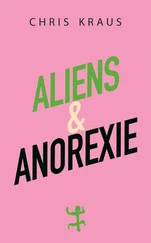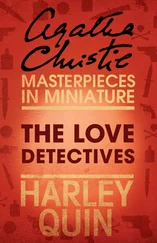Certainly he is Virtual Dick. It’s difficult to know whether certain things that Kraus describes in the book ever really happened. And Dick’s works, which at times are named and quoted in the book, are fictionalized. Real works are given fictitious titles and some quotes attributed to “Dick” appear to have been written by other people. This may have been done to further blur the real Dick’s identity and so avoid a lawsuit. The net effect, though, is curious, since the camouflage of Dick’s work continually refers back to Kraus and Lotringer themselves. In a postscript to one of Sylvère’s letters, Chris asks Dick to send a copy of his 1988 book, The Ministry of Fear (42; the “real” book is Hebdige’s Hiding in the Light ). AND THEN THERE IS the reference Kraus makes to “Dick’s” Aliens & Anorexia , A NOVEL SHE WOULD PUBLISH THREE YEARS LATER. “And then in Aliens & Anorexia you wrote about your own physical experience, being slightly anorexic,” she writes. Then she quotes from “Dick’s” work:
If I’m not touched it becomes impossible to eat. Intersubjectivity occurs at the moment of orgasm: when things break down. If I’m not touched my skin feels like the flip side of a magnet. It’s only after sex sometimes that I can eat a little. (136)
Later she quotes again from “Dick’s book.”
Anorexia is an active stance. The creation of an involuted body. How to abstract oneself from food fluxes and the mechanical sign of the meal? Synchronicity shudders faster than the speed of light around the world. Distant memories of food: strawberry shortcake, mashed potatoes… (136) “This’s one of the most incredible things I’ve read in years,” she says. (137)
Dick Hebdige hasn’t written a book called Aliens & Anorexia , but Chris Kraus has. And I don’t know if Hebdige is slightly anorexic, but Kraus has written that she is. In Aliens , she WRITES
anorexia is not evasion of a social-gender role; it’s not regression. It is an active stance: the rejection of the cynicism that this culture hands us through its food, the creation of an involuted body… Synchronicity shudders faster than the speed of light around the world. Strawberry shortcake, mashed potatoes.(163)
The observations about food fluxes and the “mechanical sign of the meal” are a paraphrase of Deleuze—whom she quotes in Aliens (163). BUT the stuff about intersubjectivity appears to have been written specifically for Dick.
“Intersubjectivity occurs at the moment of orgasm,” Kraus writes IN Aliens , “when things break down.” But intersubjectivity in the text occurs through intertextuality, when distinctions between original and citation become blurred. The lines in Aliens & Anorexia aren’t attributed to “Dick.” Given the context, it’s hard to say who is quoting from whom, BUT MY guess is that Kraus attributes her own language to “Dick” in I Love Dick —and in that way acknowledges what she explicitly states elsewhere in the text. It is through her love for Dick that she begins to write, through her passion for him that she finds her own voice. And in that sense he can be seen as an “author” of her work. But this doubling up of language and self-referentiality is also an elaborate part of the “game”—a reminder that even (or perhaps “especially”) critical texts are unstable, are signifying chains which feed off themselves. Even critical texts can be/should be seen as “fiction.”
ONE OF THE QUESTIONS KRAUS STRUGGLES WITH IS HOW TO RECONCILE WRITING WITH THE IDEA OF A FRAGMENTED SUBJECT. IT’S ONLY IN THE SECOND HALF OF THE BOOK THAT SHE SETTLES INTO THE FIRST PERSON PRONOUN. “For years I tried to write,” she tells Dick in the middle of a long piece on schizophrenia, “but the compromises of my life made it impossible to inhabit a position. And ‘who’ ‘am’ ‘I’? Embracing you & failure’s changed all that ’cause now I know I’m no one. And there’s a lot to say…” (221). RECALLING THE FAILURES OF HER EARLY NOTEBOOKS, SHE CONFESSES TO DICK:
Whenever I tried writing in the 1st Person it sounded like some other person, or else the tritest most neurotic parts of myself … But now I think okay, that’s right, there’s no fixed point of self but it exists & by writing you can somehow chart that movement. That maybe 1st Person writing’s just as fragmentary as more a-personal collage, it’s just more serious: bringing change & fragmentation closer, bringing it down to where you really are. (139)
It seems as though reading the “real” Dick Hebdige’s work enables Kraus to find a way of talking about art, a way that makes sense to her. “You write about art so well,” she tells him in I Love Dick (133). But she does, too. The essay-letters in the second half of the book “Every Letter is a Love Letter” are linked to Kraus’ obsession with Dick (her drive to his house the first time she plans to have sex with him is intercut with her memories of/meditations on Jennifer Harbury’s hunger strike on behalf of her Guatemalan husband, for example). But the essays also take on a life of their own, independent of Dick. And they are essays, not just “riffs,” as d’Adesky calls them. The piece titled “Kike Art”(186–204) is easily the best thing on Kitaj I’ve ever read, and her meditations on Hannah Wilke and Eleanor Antin are wonderful pieces of art criticism/history. I particularly like the way that she invites us, throughout these essays, to consider who gets “accepted” into the art world pantheon, who doesn’t and why. Again and again SHE ASKS US to go back to those moments we consider “avant-garde,” and read them through a slightly different lens. She invokes theory, SEEMS TO FEEL COMFORTABLE IN A THEORETICAL SKIN, without using theoretical language.
When Roland Barthes in 1970 sat down to write an enthusiastic review of one of Kristeva’s early works, he chose to call it “ L’étrangère ,” which translates approximately as ‘the strange, or foreign, woman.’ Though an obvious allusion to Kristeva’s Bulgarian nationality (she first arrived in Paris in 1966), this title captures what Barthes saw as the unsettling impact of Kristeva’s work. ‘Julia Kristeva changes the place of things,’ Barthes wrote, ‘she always destroys the latest preconception…she subverts authority’ (qtd. in Kristeva 150). I think a similar argument can be made about the “alien” nature of Chris Kraus and the unsettling impact of her work. “She always destroys the latest preconception… she subverts authority.”
Kraus tends to perform theory and, through the performance, she demonstrates how much it matters. “Every question, once it’s formulated,” she writes, “contains its own internal truth. We have to stop diverting ourselves with false questions” (218). It seems to me that that quote might be used to summarize the critical project of theory in the past decade. It certainly could be used to summarize the critical projects of the other writers (INCLUDING DICK HEBDIGE) who haunt this book.
As this edition of I Love Dick goes to press, Torpor , a new Chris Kraus title, is being released by Semiotext(e). Ending where I Love Dick begins, Torpor serves as a kind of prequel to the earlier book. But since it plays more directly with time and tense than I Love Dick , the book also serves as a kind of sequel—a nod to some distant maybe—future.
“There is a tense of longing and regret, in which every step you take becomes delayed, revised, held back a little bit. The past and future are hypothesized, an ideal world existing in the shadow of an if. It would have been ” ( Torpor 157). If there is a temporal space in which Torpor unfolds, this is it—an always already perhaps.
Читать дальше
Конец ознакомительного отрывка
Купить книгу












